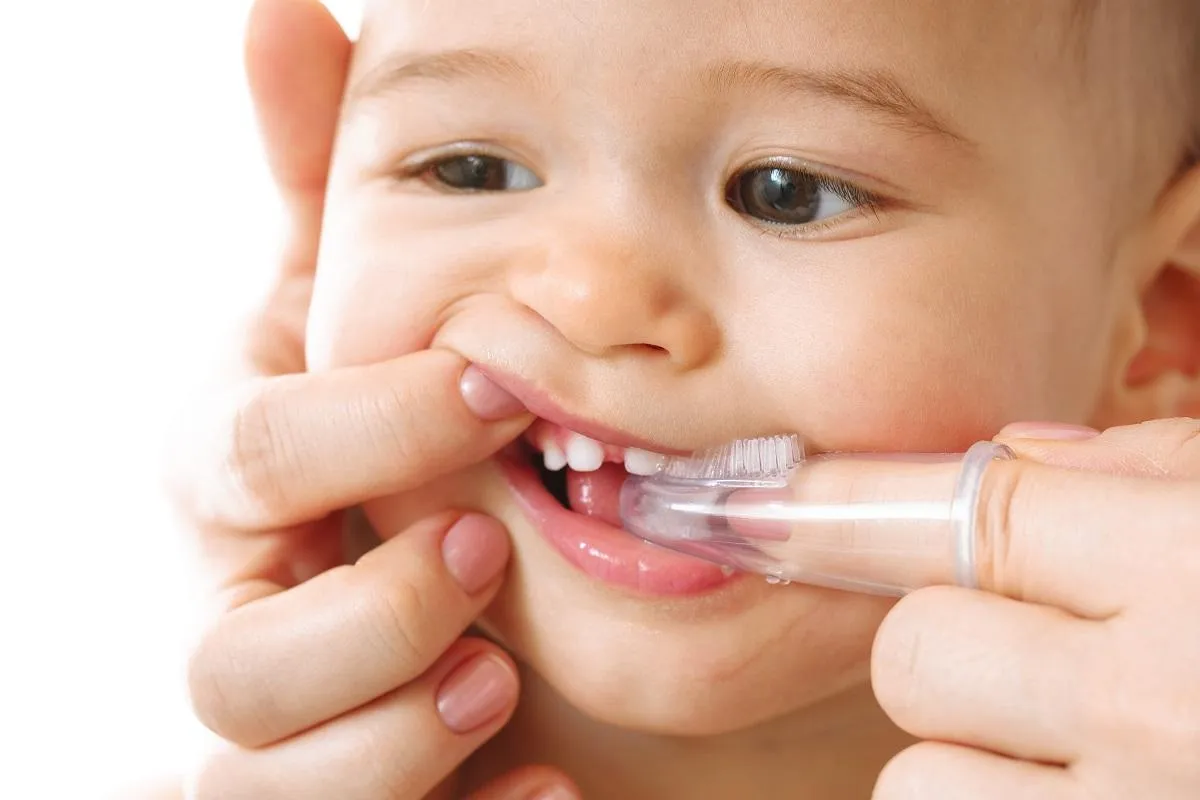Read All About It
Dental Related Articles


Building a Healthy Tooth Care Routine for your Baby: Here's How
Why Baby Tooth Care Matters
When your baby flashes their first toothy grin, it’s a milestone worth celebrating! But did you know that taking care of those tiny teeth is just as important as caring for permanent ones? Many parents assume baby teeth aren’t a big deal since they eventually fall out, but that couldn’t be further from the truth.
Establishing a healthy dental routine early can prevent cavities, support speech development, and ensure proper spacing for adult teeth. Plus, teaching your child good oral habits now sets the foundation for a lifetime of healthy smiles!
Common Parent Concerns
If you’re like most parents, you might have questions like:
Do baby teeth matter if they’re going to fall out?
When should I start brushing my baby’s teeth?
How do I prevent my child from getting cavities?
You’re not alone! Many parents worry about their children’s dental health, especially when it comes to preventing cavities and managing teething. This guide will walk you through everything you need to know about caring for your baby’s teeth with ease and confidence.
Understanding the Importance of Baby Tooth Care
How Baby Teeth Support Overall Development
Baby teeth, also known as primary teeth, play a huge role in your child’s early development. Here’s why they matter:
Help with chewing and digestion: Baby teeth allow your little one to eat a variety of nutritious foods, which is essential for their overall growth and development.
Support speech development: Teeth help in forming sounds and pronunciation. Missing or decayed baby teeth can impact how a child learns to speak.
Guide permanent teeth into place: Primary teeth act as placeholders for adult teeth, ensuring they erupt in the correct position and preventing future orthodontic issues.
Boost confidence and social development: A healthy smile helps children feel more comfortable interacting with others, supporting their emotional and social growth.
What Happens if You Neglect Baby Teeth?
Skipping dental care in the early years can have long-term effects. If a baby tooth develops a cavity, it can quickly lead to pain and infection. Since baby teeth have thinner enamel, decay can spread faster than in adult teeth. This may result in:
Difficulty eating or sleeping, leading to poor nutrition and slower development.
Tooth sensitivity and pain, leading to discomfort and increased fussiness
Speech delays or difficulty pronouncing words correctly.
Increase the risk of infection that can spread to other parts of the body, including the bloodstream.
Early loss of baby teeth, can cause permanent teeth to grow crooked or crowded, leading to the need for orthodontic treatment.
Poor oral hygiene habits carry over into adulthood, increasing the risk of chronic dental issues later in life.
Early Prevention is Key
The good news? These issues are entirely preventable with the right care and routine! By prioritizing your child’s oral health from infancy, you help set the stage for a lifetime of healthy smiles. Teaching them how to care for their teeth from an early age builds habits that will serve them well into adulthood, preventing costly and painful dental problems in the future.
Establishing a consistent brushing and flossing routine, along with regular dental checkups, ensures that potential issues are detected before they become serious. Early prevention also helps children become comfortable with dental visits, reducing anxiety and promoting a positive attitude toward oral health. Proper nutrition plays a crucial role as well, as limiting sugary snacks and drinks can significantly reduce the risk of cavities.
Additionally, fluoride treatments and dental sealants offer extra protection, helping to strengthen teeth and prevent decay. By making oral hygiene a priority from the start, parents can instill lifelong habits that lead to strong, healthy teeth and gums.
Many people don’t realize that poor oral health in childhood can have long-lasting consequences beyond the mouth. Studies have linked childhood cavities and infections to an increased risk of heart disease, diabetes, and other serious conditions later in life. By keeping baby teeth healthy, you’re not just protecting your child’s smile—you’re safeguarding their overall health!
Establishing a Healthy Tooth Care Routine
Starting Early: Before the First Tooth Appears
Before that first tiny tooth peeks through, you can already start a good oral hygiene routine:
Wipe your baby’s gums with a soft, damp cloth after feedings.
Avoid putting your baby to bed with a bottle of milk or juice to prevent "bottle rot."
Get your baby accustomed to the sensation of oral care by gently massaging their gums with a clean finger.
Introduce a soft baby toothbrush even before teeth appear to create familiarity with the brushing routine.
Building Good Habits
Once the first tooth appears (around six months), introduce a toothbrush and fluoride toothpaste. Here are some tips to build good tooth care habits in your child:
Use a grain-of-rice-sized smear of toothpaste for infants.
Have them brush twice a day, especially before bedtime.
Supervise brushing until your child can spit out toothpaste properly (around age 3).
Make brushing fun by singing songs or using a toothbrush with their favorite character!
Encourage independence by letting your child hold the toothbrush while you guide their movements.
Establish a reward system, such as a sticker chart, to motivate consistent brushing.
Teach the importance of flossing as soon as two teeth touch to prevent plaque buildup between them.
Replace toothbrushes every three months or sooner if the bristles are worn out.
Creating a Positive Dental Routine
Set a routine time for brushing in the morning and before bed to build consistency.
Use storytelling or role-playing with toys to demonstrate the importance of brushing.
Allow your child to choose their own toothbrush and toothpaste flavor to make brushing enjoyable.
Model good dental habits by brushing and flossing together as a family.
Praise and encourage effort rather than perfection to keep brushing a stress-free experience.
Nutrition and Baby Teeth: What Parents Need to Know
A healthy diet is just as important for your child’s teeth as it is for their overall growth and development. Baby teeth set the stage for lifelong oral health, and the right foods can help protect and strengthen them. On the other hand, some hidden sugars can sneak into your child’s diet, increasing the risk of cavities. Let’s take a closer look at how nutrition plays a key role in keeping your child’s smile strong and cavity-free!
What to Eat for Strong Teeth
Choosing the right foods can help strengthen enamel, reduce plaque buildup, and promote a healthy mouth. Here are some of the best foods to support growing smiles:
Dairy for Strong Enamel: Milk, cheese, and yogurt are packed with calcium and phosphorus—two key minerals that help strengthen tooth enamel. Cheese, in particular, helps neutralize acids in the mouth, lowering the risk of cavities.
Crunchy Fruits & Veggies for Natural Cleaning: Apples, carrots, celery, and cucumbers work like nature’s toothbrushes! Their crunchy texture helps scrub away plaque and stimulates saliva production, which naturally washes away food particles.
Lean Proteins for Protection: Chicken, fish, eggs, and tofu contain phosphorus, which works with calcium to protect and rebuild tooth enamel. These proteins also provide essential nutrients that help keep gums strong and healthy.
Nuts & Seeds for Essential Minerals: Almonds, cashews, and sunflower seeds are loaded with calcium and magnesium, which help keep teeth strong. Just be mindful of choking hazards for younger children.
Water: Fluoridated water helps strengthen enamel, rinse away leftover food particles, and neutralize acids that can cause cavities. Encourage your child to drink water throughout the day instead of sugary beverages.
Hidden Sugar Dangers: What to Watch Out For
Even seemingly healthy foods and drinks can contain hidden sugars that contribute to tooth decay. Here’s what to watch for:
Sneaky Snacks: Granola bars, fruit snacks, and flavored yogurts may seem like nutritious choices, but they often contain just as much sugar as candy. Try fresh fruit, unsweetened yogurt with a drizzle of honey, or whole-grain snacks instead.
Sugary Beverages: Juices, flavored milk, and sports drinks coat tiny teeth in sugar, creating the perfect environment for cavities to form. If your child drinks juice, offer it in moderation, dilute it with water, and encourage water as their primary drink.
Sticky & Gummy Treats: Gummy vitamins, fruit roll-ups, and chewy candies stick to teeth, making it harder for saliva to wash away sugar. If your child eats these treats, have them rinsed with water and brush soon after.
Healthy Habits for a Lifetime of Smiles
Good nutrition is just one part of the puzzle—daily oral care habits are just as important in protecting your child’s teeth. Start by making brushing and flossing a fun part of their daily routine. Let them choose a colorful toothbrush or a toothpaste with a flavor they love to encourage excitement about brushing. Establishing a consistent morning and bedtime brushing routine will help make dental care second nature as they grow.
Teach your child the "2x2 rule"—brushing twice a day for two minutes each time. A fun way to keep them engaged is by playing a short song or using a timer to ensure they brush for the full two minutes. Flossing should also be introduced as soon as their teeth touch, as it helps remove food particles and plaque that a toothbrush can’t reach. If traditional floss is tricky, kid-friendly flossers can make the process easier.
Hydration is another key to oral health. Encouraging your child to drink plenty of water—especially fluoridated water—helps rinse away food particles and keeps their mouth hydrated, reducing the risk of cavities. Limit sugary drinks and sticky snacks, as they can linger on teeth and contribute to decay.
Regular dental checkups are essential for maintaining a healthy smile. Scheduling visits every six months allows the dentist to catch any potential issues early and provide preventive care like fluoride treatments or dental sealants. These small steps can make a big difference in keeping your child’s teeth strong and cavity-free.
Most importantly, be a role model! Kids learn by example, so when they see you prioritizing your dental care, they’ll be more likely to follow suit. Turn brushing time into a family activity to reinforce the habit. Celebrate milestones, like a cavity-free checkup, to make oral health a positive experience.
By combining good nutrition, daily oral care, and regular dental visits, you’re setting your child up for a lifetime of strong, healthy smiles. Every small effort today helps build a foundation for excellent oral health in the future!
Choosing the Right Pediatric Dentist
When it comes to your child’s dental health, choosing the right pediatric dentist is one of the most important decisions you can make. A great pediatric dentist does more than just clean teeth—they create a positive and stress-free experience that sets the foundation for a lifetime of healthy smiles. But with so many options available, how do you find the perfect fit for your child? Here’s what to look for when selecting a pediatric dentist.
What to Look for in a Pediatric Dentist
Specialized Training & Experience: Pediatric dentists undergo additional years of specialized training beyond dental school to understand the unique needs of infants, children, and teens. They are experts in handling everything from teething to orthodontic concerns, ensuring your child receives the best possible care from day one. Look for a dentist who is board-certified and has a strong reputation for working with kids.
A Kid-Friendly Environment: A child’s early experiences at the dentist can shape how they feel about dental care for life. A welcoming, colorful, and playful office can make a world of difference. From fun decorations and engaging activities in the waiting area to child-sized dental chairs and friendly staff, the right pediatric dentist creates an atmosphere where kids feel at ease.
Gentle and Patient-Centered Approach: Children, especially those who are anxious or have special needs, require a dentist who is gentle, patient, and reassuring. A good pediatric dentist takes the time to explain procedures in kid-friendly terms, using positive reinforcement to build trust. Whether it’s a simple check-up or a more complex procedure, your child should feel safe and supported.
Parent Involvement & Clear Communication: As a parent, you want to stay informed about your child’s dental health. The best pediatric dentists welcome questions and provide clear, honest guidance on everything from brushing techniques to dietary tips. They should take the time to explain treatment options and ensure you feel confident in every decision regarding your child’s care.
Positive Reviews & Referrals: Word of mouth is powerful. Look for a dentist with excellent reviews from other parents, highlighting their kindness, expertise, and ability to create a positive experience. If you’re unsure, ask friends, family, or even your child’s pediatrician for recommendations.
Why Dr. Joby Hurst is the Best Choice for Your Child
If you’re searching for a pediatric dentist who combines expertise with a compassionate approach, look no further than Dr. Joby Hurst. With years of specialized experience in pediatric dentistry, Dr. Hurst understands that every child is unique. His practice is built on creating a fun, stress-free, and educational experience for both children and parents.
Here’s why families trust Dr. Hurst with their little ones’ smiles:
Specialized in Pediatric Dentistry: Dr. Hurst has extensive training in treating infants, children, and teens, including those with special needs. His expertise ensures that your child receives gentle, high-quality care.
A Fun & Kid-Friendly Office: From the moment you step into the office, you’ll notice a welcoming atmosphere designed just for kids. The goal is to make dental visits something to look forward to, not fear.
Gentle & Reassuring Approach: Dr. Hurst and his team understand that dental visits can feel intimidating for children. With a patient, friendly, and comforting demeanor, they ensure your child feels at ease during every visit.
Parent-Focused Communication: You’ll never be left in the dark about your child’s dental health. Dr. Hurst takes the time to educate and empower parents, ensuring you have the knowledge and confidence to support your child’s oral care at home.
Flexible & Convenient Appointments: Located at 19 Inverness Center Parkway, Suite 250, Birmingham, AL, Dr. Hurst’s office offers easy scheduling options to fit your busy life. Whether it’s a routine check-up or an urgent dental need, his team is ready to help.
Conclusion
Taking care of your child’s baby teeth is one of the most important steps in setting them up for a lifetime of healthy smiles. From building strong oral hygiene habits early to choosing the right pediatric dentist, every decision you make now impacts your child’s future dental health. Prioritizing routine dental visits and a fun, engaging tooth care routine helps prevent cavities, promotes confidence, and makes dental care a positive experience.
At Hurst Pediatric Dentistry, we are dedicated to providing gentle, expert care in a welcoming, kid-friendly environment. Start your child’s journey to a healthy, happy smile today—call us at 205-969-7454 to schedule their appointment and give your child the gift of a happy, healthy smile.

19 INVERNESS CENTER PARKWAY, STE 250, BIRMINGHAM, AL 35242
TEL: 205.969.7454
E-MAIL: [email protected]
2018 © ALL RIGHTS RESERVED | PRIVACY POLICY | TERMS AND CONDITIONS
Site by Trustway Marketing Powered by Kyrios Systems